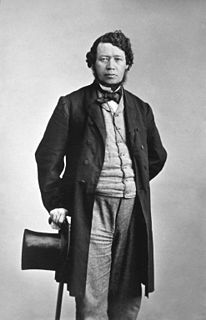A Quote by Paul Klee
We document, explain, justify, construct, organize: these are good things, but we do not succeed in coming to the whole. But we may as well calm down: construction is not absolute. Our virtue is this: by cultivating the exact we have laid the foundations for a science of art, including the unknown X.
Related Quotes
Everything we did was done in form and with propriety, and the result of our proceedings is the document [the Quebec Resolutions] that has been submitted to the imperial government as well as to this house and which we speak of here as a treaty. And that there may be no doubt about our position in regard to that document we say, question it you may, reject it you may, or accept it you may, but alter it you may not.
Knowledge signifies things known. Where there are no things known, there is no knowledge. Where there are no things to be known, there can be no knowledge. We have observed that every science, that is, every branch of knowledge, is compounded of certain facts, of which our sensations furnish the evidence. Where no such evidence is supplied, we are without data; we are without first premises; and when, without these, we attempt to build up a science, we do as those who raise edifices without foundations. And what do such builders construct? Castles in the air.
Science is wonderful at destroying metaphysical answers, but incapable of providing substitute ones. Science takes away foundations without providing a replacement. Whether we want to be there or not, science has put us in the position of having to live without foundations. It was shocking when Nietzsche said this, but today it is commonplace; our historical position-and no end to it is in sight-is that of having to philosophise without 'foundations'.
By the age of three, the child has already laid down the foundations of his personality as a human being, and only then does he need the help of special scholastic influences. So great are the conquests he has made that one may well say: the child who goes to school at three is already a little man.
Magic is a combination of art and science. It's an art because of the traditional parts of things, the graceful gestures, the sonorous invocations, the use of colour, sight, sound, all of these things make it very much an art form. Yet it is also a science as well because we expect something to come of what we do. Using and creating these almost dreamlike inner landscapes in which we can live, move, and have our being.
There is no word or action but may be taken with two hands,--either with the right hand of charitable construction, or the sinister interpretation of malice and suspicion; and all things do succeed as they are taken. To construe an evil, action well is but a pleasing and profitable deceit to myself; but to misconstrue a good thing is a treble wrong,--to myself, the action, and the author.
It is a pity to make a mystery out of what should most easily be understood. There is nothing occult about the thought that all things maybe made well or made ill. A work of art is a well-made thing - that is all. It may be a well-made statue of a well-made chair or a well-made book. Art is not a special sauce applied to ordinary cooking; it is the cooking itself that is good. Most simply and generally, Art may be thought of as "The Well Doing of What Needs Doing."
If the essence of cynicism consists in preferring nature to art, virtue to beauty and science; in not bothering about the letter of things -- to which the Stoic strictly adheres -- but in looking up to the spirit of things; in absolute contempt of all economic values and political splendor, and in courageous defence of the rights of independent freedom; then Christianity would be nothing but universal cynicism.








































